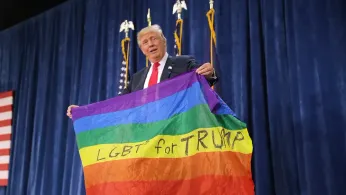
4 hours ago
Trump Says He’d Consider Banning LGBTQ+ Pride Flags in Alarming Oval Office Exchange
READ TIME: 4 MIN.
In a highly scrutinized Oval Office exchange on Monday, President Donald Trump declared he would have "no problem" with removing LGBTQ+ Progress Pride flags from the streets of Washington, D.C., and suggested he might consider treating them as symbols of domestic terrorism. The remarks came during a conversation with Brian Glenn, a correspondent for the conservative outlet Real America's Voice and partner of Representative Marjorie Taylor Greene. Glenn presented Trump with a photo of a flag hanging prominently in a well-known LGBTQ+ neighborhood, claiming that its presence was threatening to many people and asking if Trump would support its removal .
Trump responded, "Well, I wouldn’t be," adding, "Then they'll sue, and they'll get freedom of speech stuff... So that'll happen. But I would have no problem with it" . He went on to compare the display of Pride flags to burning the American flag, an act he previously attempted to criminalize via executive order, describing both as incitements to violence .
The conversation rapidly intensified as Glenn asserted that the Progress Pride flag could represent "transtifa," a term used in some right-wing circles to claim the existence of a transgender-led domestic terrorist group. Glenn suggested that if the flag represented such a group, it could be banned under federal law. Trump agreed, stating, "I think you probably could. Again, you'll be sued, and it's okay. I've been sued before a couple of times" .
This narrative mirrors recent patterns in right-wing media that have attempted to associate transgender people and symbols with violence, including misleading reporting following recent violent incidents . Officials in Minnesota and other states have condemned these attempts to scapegoat transgender people after high-profile crimes, reaffirming that such claims are not supported by evidence .
Legal experts and LGBTQ+ advocates were swift to point out that the Supreme Court has consistently ruled that symbolic displays, including flags, are protected under the First Amendment's free speech clause. The Progress Pride flag, designed in 2018 by nonbinary artist Daniel Quasar, is widely recognized as a symbol of inclusion and visibility for the LGBTQ+ community, including people of color and those lost to HIV and AIDS .
In a statement released Tuesday, Lambda Legal, a national LGBTQ+ legal advocacy organization, emphasized, "The right to display the Pride flag is a well-established form of protected speech. Attempts to ban or remove such symbols from public view would face immediate and significant constitutional challenges."
Sarah Kate Ellis, President and CEO of GLAAD, added, "Targeting LGBTQ+ symbols is part of a larger effort to erase LGBTQ+ Americans from public life, and we will not be intimidated. Pride flags represent hope, resilience, and the ongoing fight for equality."
The American Civil Liberties Union (ACLU) also weighed in, citing decades of Supreme Court precedent that protect symbolic expression, regardless of political popularity. The organization has previously defended the right to display Pride flags on government property and at public events, underscoring the principle that freedom of speech protects all Americans .
The Progress Pride flag, first introduced in 2018, builds on the classic rainbow flag by adding a chevron of light blue, pink, and white to represent transgender people, as well as black and brown stripes to honor LGBTQ+ people of color and those lost to HIV and AIDS . It is a prominent symbol at Pride parades, on public buildings, and in community spaces nationwide.
For many in the LGBTQ+ community, the flag is not only a marker of identity but also a testament to decades of advocacy and the ongoing struggle for rights and recognition. Attempts to ban or delegitimize the flag are viewed by advocates as part of a larger pattern of anti-LGBTQ+ rhetoric and policy proposals in the current political climate .
The president's remarks have drawn condemnation from major LGBTQ+ rights groups and civil liberties organizations across the United States. Many warn that such rhetoric can increase stigma, embolden hate, and contribute to a climate of fear for LGBTQ+ people, especially transgender individuals who are already disproportionately targeted by violence and discrimination .
At the same time, legal scholars anticipate that any executive action or local ordinance attempting to ban Pride flags from public spaces would be immediately challenged in court and almost certainly struck down based on existing First Amendment jurisprudence. The Supreme Court has repeatedly affirmed that even controversial or unpopular symbolic speech is protected, so long as it does not directly incite violence .
Advocates urge supporters and allies to remain vigilant, to continue displaying Pride flags as acts of visibility and resistance, and to report any efforts at censorship or intimidation to relevant legal organizations.
The Oval Office exchange underscores the deep divisions in current American political discourse around LGBTQ+ visibility and rights. It also signals the likelihood of further legal and cultural battles over the public display of LGBTQ+ symbols in the lead-up to the 2026 election cycle.
For now, the Progress Pride flag remains a legal and protected emblem of inclusion, solidarity, and the fight for equality — even as its meaning and place in public life continue to be contested by those in positions of power.






